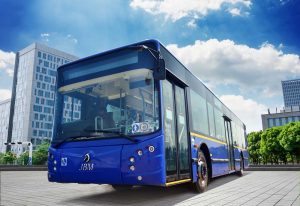India is adopting electric buses (EV buses) to encourage sustainable transport and combat pollution. Indian companies are spearheading this shift by producing electric buses specifically for the country’s requirements. This article gives a rundown of the leading EV bus makers in India, their contribution, and specifications.
1. Tata Motors

Tata Motors, a well-known entity in India’s auto industry, has played a pivotal role in bringing electric buses to India. Their electric bus portfolio features models such as the Tata Ultra, Tata Urban, and Starbus EV in both AC and non-AC configurations. These buses are intended for city commutes and provide a run of up to 150 km on a single charge. Tata Motors plans to put more than 3,500 electric buses on Indian roads by mid-2025, helping the nation achieve its green mobility objectives.
2. Olectra Greentech Limited

Hyderabad-based Olectra Greentech is a leader in India’s electric bus manufacturing. Jointly with BYD, Olectra has created models such as the eBuzz K9, which are appropriate for intra-city and inter-city use. Olectra has already installed more than 1,000 electric buses in Indian cities like Hyderabad, Mumbai, and Delhi. Olectra will supply a minimum of 2,500 electric buses by fiscal 2025, reasserting its vision for eco-friendly transportation.
3. JBM Auto

JBM Auto has its ECO-LIFE electric buses, India’s first 100% electric, zero-emission buses. These buses are made under the ‘Make in India’ campaign with a target of creating pollution-free and sound-free transport. JBM provides end-to-end e-mobility solutions such as electric buses, charging infrastructure, and battery technologies. JBM has received orders for 5,000 electric buses from state transport undertakings and private players.
4. Ashok Leyland (Switch Mobility)

Ashok Leyland, through its subsidiary Switch Mobility, has been a market leader in India’s electric bus market. The company launched the Circuit Electric Bus in 2016, and it made its entry into the electric vehicle segment. Switch Mobility deals in models such as Switch EiV 12, which is suitable for city driving with aspects of quick charging and long range. Ashok Leyland commands a market share of 19.8% in India’s electric bus market during the fiscal year 2022-23.
5. PMI Electro Mobility

PMI Electro Mobility has become a top electric bus manufacturer in India, with the highest market share of 31.5% during the fiscal year 2022-23. The company has put more than 1,200 electric buses on the road across the country and has an order book of around 2,500 buses. PMI is committed to offering efficient and environmentally friendly transportation solutions, supporting the nation’s sustainable mobility efforts.
6. EKA Mobility

EKA Mobility is a relatively new player in the Indian electric bus industry, with an emphasis on innovation and sustainability. The company has won orders for approximately 500 electric buses and is part of Macquarie Group’s $1.5 billion EV financing platform in India. EKA Mobility plans to supply up to 2,000 electric buses within the next three to five years, enabling fleet electrification in the country.
7. Easy Trip Planners

Easy Trip Planners, which is famous for its online travel business, has forayed into the manufacturing of electric buses by investing ₹2 billion ($23.8 million). The firm aims to manufacture 4,000 to 5,000 electric buses within two to three years and offer them for inter-city trips through its platform YoloBus. This step follows the increasing demand for eco-friendly transport solutions in India.
Features of Electric Buses in India:
Zero Emissions: Electric buses produce no tailpipe emissions, contributing to improved air quality in urban areas.
Noise Reduction: These buses operate quietly, reducing noise pollution in cities.
Cost Efficiency: Lower operating and maintenance costs make electric buses economically viable in the long term.
Advanced Technology: Features like regenerative braking, fast charging, and battery swapping enhance operational efficiency.
Government Support: Initiatives like FAME I and FAME II provide subsidies and incentives for electric vehicle adoption.
India’s electric bus industry is rapidly evolving, with various players making a difference in the area of green transport solutions. Through innovation, funding, and policies, these firms are leading the shift towards a greener and more efficient public transportation system.

